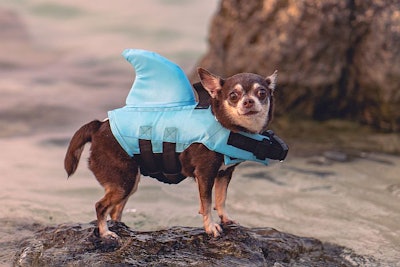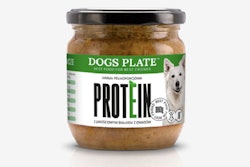
Two independent studies have found evidence of endangered sharks in pet food sold on opposite sides of the planet by some of the world’s top pet food companies. Yet the mystery remains how animals in danger of extinction, including mako or silky sharks, ended up in pet foods sold in Singapore or the United States. Neither Mars Petcare nor Nestlé Purina PetCare uses sharks in any of their recipes. Both have supply chain protocols designed to screen out ingredients made with sharks, along with other endangered species. While scientists have identified the genetic signatures of sharks in pet foods, researchers need to investigate how sharks enter the pet food chain despite preventive measures.
Studies found shark DNA in pet foods
A biologist identified 17 examples of DNA from endangered mako shark (Isurus oxyrinchus) and one from the blue shark (Prionace glauca) in pet foods sold in the U.S. He published his results in Conservation Genetics in 2019.
More recently, researchers identified shark genetic material in cat foods purchased in Singapore, including Fancy Feast, Sheba, Whiskas, Kit Cat and Aixia Yaizu. The scientists found genetic signatures of endangered silky sharks and other species in more than 30 pet foods made in Thailand. However, the study’s authors couldn’t determine the route by which the shark meat made its way into the pet food supply chain. Silky sharks face tremendous hunting pressure for their fins. The researchers speculated in the journal Frontiers in Marine Science that the presence of the silky sharks may reflect the use of the rest of their carcasses in pet food.
If so, it goes against the policies of the two largest pet food companies by annual revenue. Representatives of both Mars Petcare and Purina PetCare stated that their companies never use any sharks, much less endangered species, in recipes.
“If true, this is a deeply worrying study,” Lisa Campbell, external affairs director for Mars Petcare, told Petfood Industry in an email. “We do not source any endangered fish species, as defined by the International Union for Conservation of Nature (IUCN) Red List of Threatened Species.
Mars Petcare has reached out to suppliers associated with the pet foods involved in the Singapore study.
“All the materials and raw ingredients that we and our suppliers use must meet our own strict global internal quality and safety requirements," she said. "We have conducted supply chain mapping and validated traceability systems of our suppliers which includes the ‘no shark finning policy’ according to traceability standards of the International Sustainable Seafood Foundation (ISSF).
“We do not use sharks in our supply chain. From this study, it asks us to look for the potential cross-contamination, for example, whether tuna intake may have caused cross-contamination. We have reached out to our suppliers of the products indicated in the report to reiterate our clear standards and expectations and understand where control processes need to be strengthened if needed.”
Likewise, Purina uses various systems to trace the ingredients in its pet food.
“We have comprehensive Responsible Sourcing Guidelines to ensure that all wild-caught and farmed seafood supplied to Purina comes from responsible sources,” Wendy Vlieks, senior director of public relations for Nestlé Purina PetCare, wrote in an email. “Every Purina ingredient supplier must meet our stringent standards for ingredient specifications (product safety, sanitation and manufacturing practices). They must not source fish and seafood ingredients that contain IUCN (International Union for Conservation of Nature) red-listed endangered species and must not acquire or capture any illegal, unregulated and unreported (IUU) seafood.”
Stopping sharks from entering pet food supply chain
While both pet food companies have policies in place, the mystery of shark meat in pet food remains. However, there are still only a few studies identifying sharks’ DNA in the pet food supply chain, and even less published research on how those endangered fish ended up in pet foods. Pet food companies aren’t intentionally adding sharks. On the contrary, they have extensive guidelines and rules to prevent endangered species from entering their supply chains. Yet, genetic evidence on opposite sides of the planet suggests that endangered sharks inadvertently enter the pet food supply chain. Frontiers in Marine Science study co-author Benjamin Wainwright, assistant professor of marine biology at Yale-NUS, suggested better labeling and more accountability throughout the supply chain.
“We have set a goal to use 100% sustainable fish in our recipes and today source 81% from sustainable sources,” Campbell said. “Fish is a key ingredient for some of our pet food recipes for its nutritional value and, while we source a very small amount of fish overall, we know we have a responsibility to drive sustainable fishing.
“Mars Petcare believes supply chain mapping is an integral part of traceability as it helps us to identify if any vessel in our supply chain is engaging in Illegal, Unreported and Unregulated (IUU) fishing, which would violate our sourcing policies. Mars Petcare has conducted 100% supply chain mapping of our Thai fish supply chains across our Tier 1 fish suppliers as per the Seafood Taskforce membership requirements, Mars Petcare had served previously as a Board member and active contributor to this Taskforce.
“Mars Petcare is also partnering with WWF as we gradually shift towards compliance to the Global Dialogue on Seafood Traceability (GDST) as part of increasing seafood transparency and harmonization of different traceability standards.”
No answers have been found to the conundrum of shark DNA appearing in pet food. Increased vigilance and traceability may be the solution, even if the precise route by which sharks entered the pet food supply chain remains a mystery.


















